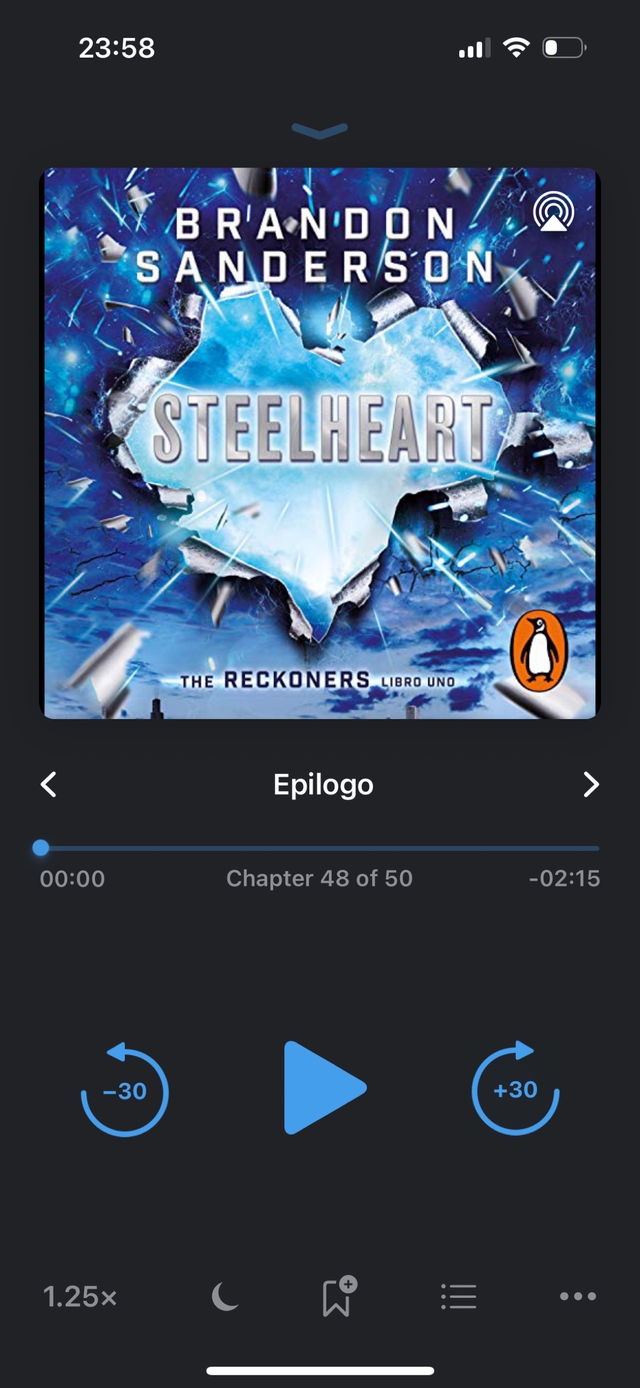Create an audiobook file from several mp3 files using ffmpeg
Due to some recent traveling I have started to listen to audiobooks. I love reading but some times my eyes are just too tired to go with it but I’m not sleepy at all or maybe I just wanted the convenience to lay down but still do something.
Short story, I bought some from a known distributor but I’m a fan of data preservation and actually owning what I pay for. I found an application in Github that allowed me to download the files that composed the audiobook in split mp3 files, but that didn’t do. I wanted a single file with correct metadata, so I got my hands dirty.

Assuming you have the mp3 laying around in a folder, we need to generate or find three more things:
files.txt: A list of the MP3 files in the order we are going to combine them, in a plain text file with the formatfile '<filename>'.You can use a simple bash command to generate the file:
1find . -type f -name "*mp3" -exec printf "file '%s'\n" {} \; | sed "s|\.\/||g" > files.txtmetadata.txt: A metadata file to be used with the bundled file that contain basic information of the audiobook (title, author, narrator, …) along with chapter information.An example looks like this, documentation can be found in the ffmpeg documentation:
1 2 3 4 5 6 7 8 9 10 11 12 13 14;FFMETADATA1 title=Book name artist=Book author(s) composer=Book narrator(s) publisher=Book publisher date=Book date of publication [CHAPTER] TIMEBASE=1/1000 START=0 # 0:00:00 END=60000 # 0:01:00 title=Intro # Chapter title # Repeat the [CHAPTER] block for all chapterscover.jpg: The artwork of the audiobook. The files I have been using (downloaded from the store) are 353x353@72dpi. I’m unsure if that’s by definition, but at least be sure to use squared images.
With all the files in place, we can use ffmpeg to do the conversion. I have followed a multi step approach to make sure I can review the process and fix any issues that may arise. Pretty sure this can be simplified somehow but I’m not a ffmpeg expert and I have spent too much time on this already.
- Concatenate the files into a single
mp3file.
| |
-f concat: Use theconcatformat, meaning we are going to concatenate files.-i files.txt: The file with the list of files to concatenate as input to ffmpeg.-c copy: The stream copy codec for each stream, meaning we are not going to re-encode the files, just copy them.build_01_concat.mp3: The output file.
- Add the cover to the file.
| |
-i build_01_concat.mp3: The file created in the above step to be used as input to ffmpeg.-i cover.jpg: The cover image to be added to the file as second input to ffmpeg.-c copy: The stream copy codec for each stream, meaning we are not going to re-encode the files, just copy them.-map 0 -map 1: Maps the streams from the input files to the output file.build_02_cover.mp3: The output file.
- Convert the
mp3file tom4a.
| |
-i build_02_cover.mp3: The file created in the above step to be used as input to ffmpeg.-c:v copy: The video codec to be used for the output file, meaning we are not going to re-encode the file, just copy it.build_03_m4a.m4a: The output file.
- Add the metadata to the
m4afile and convert it tom4b.
| |
-i build_03_m4a.m4a: The file created in the above step to be used as input to ffmpeg.-i metadata.txt: The metadata file to be used as second input to ffmpeg.-map 0 -map_metadata 1: Maps the streams from the input files to the output file.-c copy: The stream copy codec for each stream, meaning we are not going to re-encode the files, just copy them.book.m4b: The final output file.
- Clean up the files we created in the process that we don’t need anymore.
| |
That’s it! You should have a m4b file with the audiobook ready to be imported to your favorite audiobook player. I have tested this process with a couple of books and it worked like a charm. I hope it helps you too.